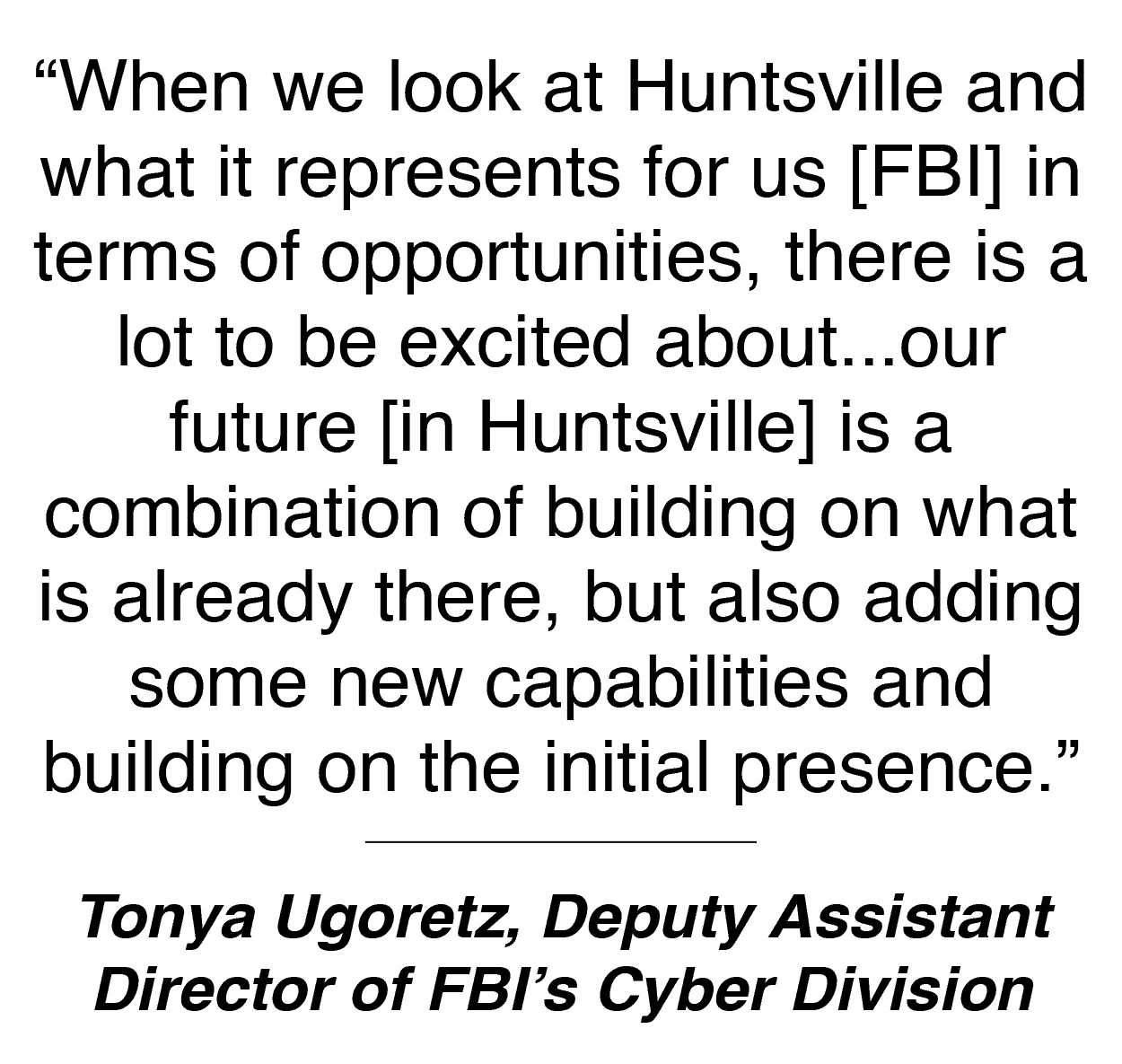INSA Takes Virtual Road Trip to Huntsville, AL
May 26, 2021

On Wednesday, May 19, INSA took a virtual trip to visit the Intelligence Community down in Huntsville, Alabama. The event kicked off with welcome remarks from the Deputy Assistant Director (DAD) of FBI's Cyber Division Tonya Ugoretz, who referred to Huntsville, and specifically Redstone Arsenal, as the FBI’s center of gravity for technology and innovation. DAD Ugoretz highlighted areas of potential growth for the FBI in Huntsville, including the development of specialized training programs and advanced technologies through the FBI’s new innovation center. She also noted a particular focus on diversifying the agency’s physical presence and workforce in the region to enhance the resiliency and continuity of FBI operations, which have grown tremendously in Redstone Arsenal since the FBI first landed in the area in the 1970s. DAD Ugoretz discussed how Huntsville fits into the FBI’s Cyber Strategy, released in February 2020, which focuses on imposing risks and consequences on U.S. adversaries and cyber criminals, and highlighted the FBI’s unique authorities, world class capabilities, and enduring partnerships that continue to expand throughout the Huntsville community.
Her keynote remarks also shed light on the FBI’s threat intelligence sharing initiative designed to improve network defense and hold cyber criminals accountable. DAD Ugoretz concluded her remarks in highlighting the FBI’s new “space camp” which will be offered in partnership with U.S. Cyber Camp, designed to give young students the opportunity to gain hands-on learning and training experience working in cyber and with advanced technologies.
The event proceeded with a panel moderated by MG Barbara Fast, USA (ret.) who now serves as President & CEO of BGF Enterprises. The panel brought together representatives from government, industry, and academic organizations based in Huntsville, AL. Panelists expressed compelling enthusiasm in the current capabilities and future opportunities for growth and collaboration amongst Huntsville’s Intelligence Community. They noted the collaborative environment that has brought organizations together and advanced missions throughout the community and highlighted how the Huntsville area holds one of the highest concentration of PhD’s and high-tech workers throughout the country.
Panelist Marc Sachs, who serves as Deputy Director of the McCrary Institute for Cyber and Critical Infrastructure Security at Auburn University, highlighted the value of the University’s Huntsville Research Center and the McCrary Institute’s initiatives to enable research and educational development throughout the community in working closely with Auburn’s engineering and computer science schools. Mr. Sachs also noted the community’s increased focus on critical infrastructure in homeland security, and specifically in advancing security in the food and agriculture business and supply chain. Mr. Sachs noted Auburn University’s commitment to raising awareness of cyber threats facing the community amongst the student population, as well as creating educational and training opportunities for young people soon to enter the cyber workforce.
Panelist Luke James, who serves as a Senior Principal and Regional Director at SAIC, noted the rapid growth of Huntsville’s Intelligence Community to include large-scale data center investments and shared that there are now 78 different organizations and agencies with a presence at Redstone Arsenal. Mr. James also emphasized the collaborative community in Huntsville and noted SAIC’s motto of “Better Together” in highlighting their commitment to embracing the strengths and capabilities of their partners to execute the community’s collective mission.
Panelists also discussed the intersection between cyber and intelligence within the Huntsville community. Kimberly King, who serves as Director of DIA’s Missile and Space Intelligence Center (MSIC), discussed the agency’s growing use of threat systems leveraging AI-enabled “kill webs” versus “kill chains” given recent cyber advancements allowing for systems to be networked together. She also noted a focus on weapons systems autonomy, made possible through sensor communication hardware and advanced systems software.
Panelist Jason Fickett, who serves as Section Chief of FBI’s Cyber Division, noted the FBI’s unique role in ensuring that all of the intelligence collected and used in cyberspace is in line with the legal system in order to move forward with attribution of cyber intrusions and reach a judicial outcome.
Panelists also addressed how the community will collaborate amongst government, industry, and academia to address the rising threat from China, including improved incidence response across the community, an increased focus on cyber education, and cloud-based infrastructure support. The conversation wrapped up with strong remarks across the board regarding Huntsville’s potential for future growth and collaboration amongst government, industry, and academic partners, as showcased during this engagement.
